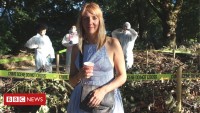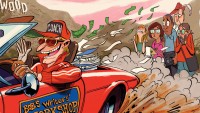
How #ShareYourRejection Reminds Us That Failure is Normal
comicsbeat.com – Sunday August 19, 2018

Big news. There’s no such thing as an overnight success. Any success we have is accompanied by years of work and often countless failures. As someone who has faced rejection more times than they could shake a stick at, finding the #ShareYourRejection hashtag on Twitter was a lightning bolt to the soul (in a good way). It all started when Saeed Jones, author and co-host of Buzzfeed’s popular AM2DM show, Tweeted about a recent rejection he recieved.

Ebooks: How digital publishers are 'shaking up' the industry
bbc.com – Wednesday August 8, 2018

JK Rowling notoriously received numerous rejections before meeting her literary agent, and later, publisher. Having stacked up at least 60 rejections in my writing career, I know exactly how that feels.
And while being a novelist recently came out on top in a survey as one of the most desirable jobs to have, it is definitely not for the faint hearted.
I now have an agent and an award, but it wasn't always that way.
As a writer, the first step to securing a publishing deal is to acquire an agent, a middle-man, basically your number one fan who will shout about how good you are to publishers and hopefully persuade them to read your carefully-crafted novel.
They are the gatekeepers to the publishing industry.
Digital publishers, however, are changing the game because they talk directly to authors.

The one piece of advice every aspiring author needs to know
independent.co.uk – Sunday August 5, 2018

If you are one of the millions of people who aspire to be a published author, I have some writing advice for you: never listen to writing advice.
Not that it’s easy to avoid. If you go on Twitter and follow the hashtag #amwriting you’ll get more unsolicited advice than you know what to do with. Do this, do that, don’t on any account do the other. Everyone it seems, has some rules for you to follow.
Which is hardly surprising, as literally almost everybody is writinga book. And I use the phrase “literally almost everybody” advisedly. At the BookExpo America conference in 2015, author Jane McGonigal claimed that 90 per cent of young people in the US say they want to write a book.

How to Write a Book Without Losing Your Mind
theatlantic.com – Thursday August 2, 2018

A few months ago, I promised some nice people in New York that I would, sometime very soon, write a book.
Since then, I have:
Called my mom rejoicing.
Called my mom crying.
Considered changing my Twitter bio, then thought better of it.
Considered emailing all my ex-boyfriends and mentors to let them know I’m an impostor, then thought better of it.
Extensively researched three different long-form writing softwares, only to find that I prefer the first one I ever tried.

Why Are So Many Wannabe Screenwriters Getting Scammed?
hollywoodreporter.com – Wednesday August 1, 2018

From "pitch fests" to online script coaches, an entire cottage industry has sprung up to help aspiring scribes crack the movie business, and while some offerings are legit, many are schemes designed to prey on the Hollywood dreams of gullible strivers.
A few weeks after Manny Fonseca arrived in Los Angeles in the early part of this decade, having left his native Michigan with the hope of becoming a Hollywood writer or executive, the then 30-year-old was at a party when a producer asked if he’d “like to make a hundred bucks.” Sure, he replied. What would he have to do?
The answer was to show up the next day at a “pitch fest,” one of dozens of such gatherings each year in which hopefuls pay hundreds of dollars to serve up their story ideas to agents and executives who, in theory, will buy them if they’re good. Fonseca would be there as one of the buyers, which struck him as strange — not only was he not an executive, he didn’t even have a proper job: he had been interning with producers Arnold Kopelson and Irwin Winkler.

Advice For Entrepreneurs Looking To Launch An Online Magazine
forbes.com – Tuesday July 31, 2018

With so many companies and individuals creating blogs on almost every topic under the sun, it can be difficult to grab your audience’s attention. However, if you consider yourself an expert on a particular subject, whether it’s gardening or real estate, you might be well-placed to launch an online magazine.
An online magazine is a digital publication on a specific subject or interest that can generate revenue and provide significant archival content. Even if there are already other magazines on the subject, you might be able to offer something uniquely valuable to your niche that establishes you as a thought leader in your field.

How the ‘brainy’ book became a publishing phenomenon
theguardian.com – Sunday July 29, 2018

This is a story about a book that just kept selling, catching publishers, booksellers and even its author off guard. In seeking to understand the reasons for the book’s unusually protracted shelf life, we uncover important messages about our moment in history, about the still-vital place of reading in our culture, and about the changing face of publishing.
The book is Sapiens, by the Israeli academic Yuval Noah Harari, published in the UK in September 2014. It’s a recondite work of evolutionary history charting the development of humankind through a scholarly examination of our ability to cooperate as a species. Sapiens sold well on publication, particularly when it came out in paperback in the summer of 2015. What’s remarkable about it, though, is that it’s still selling in vast numbers. In its first two and a half years of life, Sapiens sold just over 200,000 copies in the UK. Since 2017, when Harari published Homo Deus, his follow-up, Sapienshas sold a further half million copies, establishing itself firmly at the top of the bestseller lists (and convincingly outselling its sequel). Sapiens has become a publishing phenomenon and its wild success is symptomatic of a broader trend in our book-buying habits: a surge in the popularity of intelligent, challenging nonfiction, often books that are several years old.

This Piece Of Writing Advice From 'Ron Carlson Writes A Story' Transformed My Creative Process For The Better
bustle.com – Friday July 27, 2018

For as long as I can remember, I have always wanted to be a writer in some capacity or another. Growing up, I spent all the free time I had working on angsty teenage love poems and cringe-worthy romance stories that were in reality just thinly veiled fantasies about whoever I had a crush on that week. Back then, the words flowed out of me almost seamlessly, but as I got older, I found that writing — and I mean really writing, actually working on a novel — is a lot more difficult than it seemed a decade ago when I still believed every idea I had was pure gold and every word I put on paper was absolutely genius. It had a lot to do with my confidence, or a lack thereof and my fear of creating something terrible, embarrassing, or just plain boring. For years, I found myself starting a project with the highest of hopes, only to abandon it after a few hundred words, convinced there was no way that what I was writing was could ever become an actual work of literary art. That is, until I picked up a slim writing guide that held within its pages advice from author Ron Carlson that transformed my writing process for the better.

No, you probably don’t have a book in you
theoutline.com – Friday July 27, 2018

Has anyone ever said you should write a book? Maybe extraordinary things have happened to you, and they say you should write a memoir. Or you have an extremely vivid imagination, and they say you should write a novel. Maybe your kids are endlessly entertained at bedtime, and they say you should write a children’s book. Perhaps you just know how everything should be and imagine your essay collection will set the world straight.
Everyone has a book in them, right?
I hate to break it to you but everyone does not, in fact, have a book in them.

A Published Author Told Me To Stop Writing Fan Fiction — But The Lunar Chronicles Author Marissa Meyer Disagrees
bustle.com – Wednesday July 25, 2018

"If you ever wanted to be a published author, you need to stop writing fan fiction immediately."
I blinked, wondering how I'd gotten from standing in line for a snorkel at the beach to having my entire geeky world upended in one sentence. Several minutes earlier I'd struck up a conversation with the woman in front of me, who turned out to be a published author. It was January of 2016, so I was about 15,000 words deep into what would eventually become a monstrous, novel-length fan fiction sequel to The Force Awakens, and was so hopped up on having someone to talk writing with that I told her as much.
Cue the existential crisis.
Get the free newsletter | Submit a news item or article | Get Writers' News for your website





